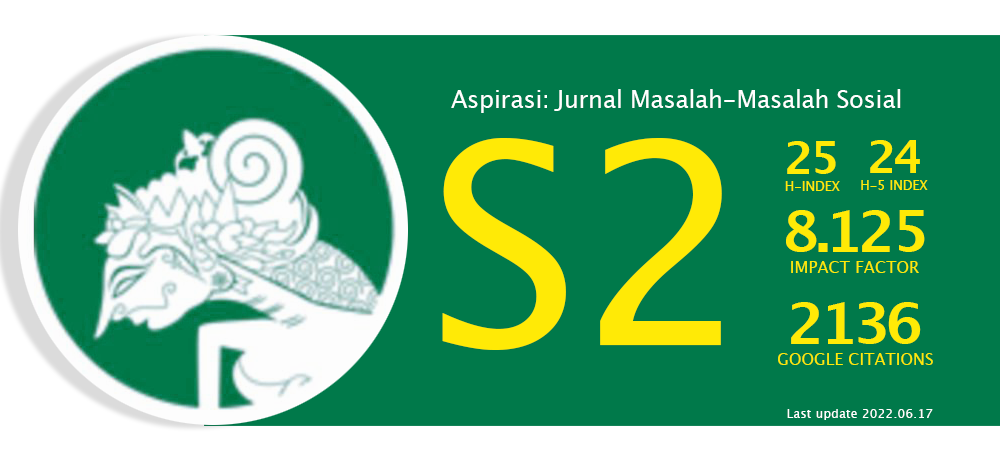Rumah Sebagai Arena Pendidikan: Adaptasi dan Strategi Orangtua di Perkotaan Mendidik Anak di Masa Pandemi
Abstract
The situation at the beginning of the pandemic changed various patterns of education in schools that had been considered normal and moved to homes. During the beginning of the pandemic, when schools were closed, learning had to move home and parents had to provide extra assistance to accompany their children's education at home. This article explores the challenges, adaptations, and strategies of parents in urban areas in assisting children in learning at the beginning of the pandemic. Interviews were conducted with the parents of workers in urban areas to get an adequate perspective on changing education patterns during the pandemic. The results of this study increasingly show the important role of parents in the education process of their children during the pandemic. The ability of parents to face challenges during the pandemic, adapt, and strategy is highly dependent on the resources they have, ranging from academic qualifications, flexibility in working time, the ability to dialogue with children, and build communication with the school. Each parent's technical and substance abilities play a very important role in helping children through the educational process during the pandemic.
Abstrak:
Situasi awal pandemi mengubah berbagai pola pendidikan yang selama ini dianggap lazim, yaitu dilakukan di lingkungan persekolahan. Selama awal pandemi, sekolah-sekolah ditutup. Pembelajaran di sekolah berpindah ke rumah sehingga orangtua harus ekstra dalam mendampingi pendidikan anak-anak di rumah. Artikel ini mengetengahkan tantangan, adaptasi, dan strategi orangtua di wilayah perkotaan dalam mendampingi anak-anak belajar di awal pandemi. Wawancara dilakukan kepada orangtua pekerja di wilayah perkotaan untuk mendapatkan perspektif memadai mengenai perubahan pola pendidikan di masa pandemi. Hasil penelitian ini menunjukkan bahwa peran orangtua semakin penting dalam proses pendidikan anak- anak. Kemampuan orangtua menghadapi tantangan di masa pandemi, melakukan adaptasi, dan strategi sangat bergantung pada sumber daya yang dimiliki mulai dari kualifikasi akademik, fleksibilitas waktu kerja, kemampuan berdialog dengan anak, dan membangun komunikasi dengan pihak sekolah. Kemampuan teknikal dan substansi orangtua sangat berperan dalam membantu anak melalui proses pendidikan di masa pandemi. Komisi X DPR RI melalui fungsi pengawasan perlu memantau, mengawasi, dan memberi dukungan terhadap kebijakan pemerintah berkaitan dengan pendidikan serta memastikan tidak ada kebijakan pendidikan yang memarjinalkan anak-anak dengan kerentanan berlapis akibat pandemi Covid-19.
Keywords
Full Text:
PDFReferences
Afriansyah, A. (2020a, September 26). Dialog orangtua, guru dan siswa. Republika.id. Diakses dari https://www.republika.id/posts/10483/dialog-guru-orang-tua-dan-siswa
Afriansyah, A. (2020b, Desember 23). Daya tahan dalam mendidik. Republika.id. Diakses dari https://www.republika.co.id/berita/qlrkg33525000/daya-tahan-dalam-mendidik
Alifia, U., Barasa, A. R., Bima, L., Pramana, R. P., Revina, S., & Tresnatri, F. A. (2020). Learning from Home: Portrait of Teaching and Learning Inequalities in Times of The Covid-19 Pandemic. [SMERU Briefs]. Diakses dari http://smeru.or.id/en/content/learning-home-portrait-teaching-and-learning-inequalities-times-covid-19-pandemic
Bhamani, S., Makhdoom, A. Z., Bharuchi, V., Ali, N., Kaleem, S., & Ahmed, D. (2020). Home learning in times of COVID: Experiences of parents. Journal of Education and Educational Development, 7(1), 9–26. http://dx.doi.org/10.22555/joeed.v7i1.3260
Bona, M. F. (2020, November 13). Survei: 56 persen orangtua jenuh mendampingi anak PJJ. Beritasatu.com. Diakses dari https://www.beritasatu.com/nasional/698037/survei-56-persen-orang-tua-jenuh-mendampingi-anak-pjj, pada 24 November 2021.
Brossard, M., Cardoso, M., Kamei, A., Mishra, S., Mizunoya, S., & Reuge, N. (2020). Parental engagement in children’s learning (Innocenti Research Brief 2020-09). United Nations Children's Fund. Diakses dari https://www.unicef-irc.org/publications/pdf/IRB%202020-09%20CL.pdf
Cheek, J. (2021, Februari 3). Trapped at home during the coronavirus pandemic? Here’s how parents can get through challenging moments. TheConversation.com. Diakses dari https://theconversation.com/trapped-at-home-during-the-coronavirus-pandemic-heres-how-parents-can-get-through-challenging-moments-154166
Diana, R. (2020). Peran orangtua dalam pendidikan anak di era pandemi COVID-19 [Paparan Presentasi]. Diakses dari https://s3ppi.umy.ac.id/wp-content/uploads/2020/06/Dr.-Rachmy-Diana-Peran-Orang-Tua-dalam-Pendidikan-Anak-Masa-pandemi.pdf
Easterbrook, M. J., Doyle, L., Grozev, V. H., Kosakowska-Berezecka, N., Harris, P. R., & Phalet, K. (2022). Socioeconomic and gender inequalities in home learning during the COVID-19 pandemic: examining the roles of the home environment, parent supervision, and educational provisions. Educational and Developmental Psychologist, 1–13. https://doi.org/10.1080/20590776.2021.2014281
Faber, A. & Mazlish, E. (2020). Menjadi orangtua ada strateginya: cara mudah dan santai mendidik anak (edisi terjemahan). Gramedia Pustaka Utama.
Fersch, B., Schneider-Kamp, A., & Breidahl, K. N. (2022). Anxiety and trust in times of health crisis: How parents navigated health risks during the early phases of the COVID-19 pandemic in Denmark. Health, Risk & Society, 1–18. https://doi.org/10.1080/13698575.2022.2028743
Gordon, T. (2020). Menjadi orangtua efektif: cara pintar mendidik anak agar bertanggung jawab. Gramedia Pustaka Utama.
Gandhawangi, S. (2020 September, 28). Pandemi Covid-19, saatnya orangtua mengajarkan anak jadi lebih tangguh. Kompas.id. https://kompas.id/baca/humaniora/dikbud/2020/09/28/pandemi-saatnya-orangtua-mengajarkan-anak-jadi-tangguh/, pada 1 April 2021.
Gottman, J., & DeClaire, J. (2008). Mengembangkan kecerdasan emosional anak. Gramedia.
Hayes, N., Berthelsen, D. C., Nicholson, J. M., & Walker, S. (2018). Trajectories of parental involvement in home learning activities across the early years: associations with socio-demographic characteristics and children’s learning outcomes. Early Child Development and Care, 188(10), 1405–1418. https://doi.org/10.1080/03004430.2016.1262362
Haryatmoko. (2020). Jalan baru kepemimpinan dan pendidikan. Gramedia Pustaka Utama.
Huber, S. G., & Helm, C. (2020). COVID-19 and schooling: evaluation, assessment and accountability in times of crises—reacting quickly to explore key issues for policy, practice and research with the school barometer. Educational Assessment, Evaluation and Accountability, 32(2), 237–270. https://doi.org/10.1007/s11092-020-09322-y
Kamerman, S. B. (1979). Work and family in industrialized societies. Signs: Journal of Women in Culture and Society, 4(4), 632–650. http://www.jstor.org/stable/3173363
Kementerian Pendidikan dan Kebudayaan. (2020, Agustus 8). Penyesuaian kebijakan pembelajaran di masa pandemi COVID-19. Jakarta: Kemdikbud. https://covid19.go.id/p/protokol/penyesuaian-kebijakan-pembelajaran-di-masa-pandemi-covid-19
Komisi Perlindungan Anak Indonesia (KPAI). (2021). Siaran pers laporan kinerja tahun 2020 Komisi Perlindungan Anak Indonesia: Perlindungan anak di era pandemi COVID-19. Jakarta: KPAI.
Kurnianto, B., & Rahmawati, R. D. (2020, September). Hubungan pola asuh orangtua terhadap motivasi belajar siswa pada pembelajaran Daring Masa Pandemi. In Seminar Pendidikan Nasional (SENDIKA) (Vol. 2, No. 1).
Menter, K., Ritchie, T., Ogg, J., Rogers, M., Shelleby, E. C., Santuzzi, A. M., & Wendel, M. J. (2020). Changes in parenting practices during the COVID-19 pandemic: Child behavior and mindful parenting as moderators. School Psychology Review, 1–18. https://doi.org/10.1080/2372966X.2020.1869497
Merkas, M., Peric, K., & Zulec, A. (2021). Parent distraction with technology and child social competence during the COVID-19 pandemic: The role of parental emotional stability. Journal of Family Communication, 21(3), 186–204. https://doi.org/10.1080/15267431.2021.1931228
Mohan, G., Carroll, E., McCoy, S., Mac Domhnaill, C., & Mihut, G. (2021). Magnifying inequality? Home learning environments and social reproduction during school closures in Ireland. Irish Educational Studies, 40(2), 265–274. https://doi.org/10.1080/03323315.2021.1915841
Ngadi, Meilianna, R, Purba, YA. (2020). Dampak pandemi covid-19 terhadap phk dan pendapatan pekerja di Indonesia. Jurnal Kependudukan Indonesia | Edisi Khusus Demografi dan COVID-19, Juli 2020 | 43–48.
Niklas, F., Cohrssen, C., & Tayler, C. (2016). Parents supporting learning: A non-intensive intervention supporting literacy and numeracy in the home learning environment. International Journal of Early Years Education, 24(2), 121–142. https://doi.org/10.1080/09669760.2016.1155147
Parker, F. L., Boak, A. Y., Griffin, K. W., Ripple, C., & Peay, L. (1999). Parent-child relationship, home learning environment, and school readiness. School Psychology Review, 28(3), 413–425. https://doi.org/10.1080/02796015.1999.12085974
Reuge, N., Jenkins, R., Brossard, M., Soobrayan, B., Mizunoya, S., Ackers, J., ... & Taulo, W. G. (2021). Education response to COVID 19 pandemic, a special issue proposed by UNICEF: Editorial review. International Journal of Educational Development, 87, 102485.
Ribeiro, L.M.; Cunha, R.S.; Silva, M.C.A.e; Carvalho, M.; & Vital, M.L. (2021). Parental involvement during pandemic times: challenges and opportunities. Educ. Sci. 2021, 11, 302. https://doi.org/10.3390/educsci11060302
Severe, S. (2020). Bagaimana bersikap pada anak, agar anak (pra sekolah) bersikap baik (edisi terjemahan). Jakarta: Gramedia Pustaka Utama.
Stevenson, B. (2017). Children’s independence: a conceptual argument for connecting the conduct of everyday life and learning in Finland. Children's Geographies, 15(4), 439–451. https://doi.org/10.1080/14733285.2016.1271942
The United Nations Educational, Scientific and Cultural Organization. (2020). Distance Learning Strategies in Response to COVID-19 School Closures. Issues Notes 2.1- April 2020. Diakses dari https://learningportal.iiep.unesco.org/en/library/distance-learning-strategies-in-response-to-covid-19-school-closures
The United Nations Educational, Scientific and Cultural Organization. (2020). Policy Brief: Education during COVID-19 and beyond. Diakses dari https://www.un.org/development/desa/dspd/wp-content/uploads/sites/22/2020/08/sg_policy_brief_covid-19_and_education_august_2020.pdf
The United Nations Educational, Scientific and Cultural Organization. (2021). School closures and regional policies to mitigate learning loss due to covid-19: a focus on the Asia-Pacific. Canada: UNESCO Institute for Statistic.
Von Otter, C., & Stenberg, S. Å. (2015). Social capital, human capital and parent–child relation quality: interacting for children’s educational achievement?. British Journal of Sociology of Education, 36(7), 996–1016. https://doi.org/10.1080/01425692.2014.883275
Wardhani, T. Z. Y., & Krisnani, H. (2020). Optimalisasi peran pengawasan orangtua dalam pelaksanaan sekolah online di masa pandemi Covid-19. Prosiding Penelitian dan Pengabdian Kepada Masyarakat, 7(1), 48.
Weaver, J. L., & Swank, J. M. (2021). Parents’ lived experiences with the COVID-19 pandemic. The Family Journal, 29(2), 136–142. https://doi.org/10.1177/1066480720969194
Wiryono, S. (2020, November 26). 171.998 siswa di Jakarta tak punya gawai untuk belajar jarak jauh. Kompas.com Diakses dari: https://megapolitan.kompas.com/read/2020/11/26/16531651/171998-siswa-di-jakarta-tak-punya-gawai-untuk-belajar-jarak-jauh, pada 1 April 2021.
Yoenanto, N. H. (2020). Kesiapan orangtua menjadi ‘guru’ di rumah. [paparan presentasi]. Departemen Psikologi Pendidikan dan Perkembangan Fakultas Psikologi Universitas Airlangga. Diakses dari https://psikologi.unair.ac.id/wp-content/uploads/2020/05/13-Kesiapan-Orangtua-Menjadi-‘Guru’-di-Rumah.pdf
Zhao, J. H., Wu, P. Z., & Lin, X . Y. (2020). Guidance for parents and communities: Online education during COVID-19 pandemic. Shenzhen: Center for Higher Education Research, Southern University of Science and Technology.
DOI: https://doi.org/10.46807/aspirasi.v13i1.2168
Refbacks
- There are currently no refbacks.








